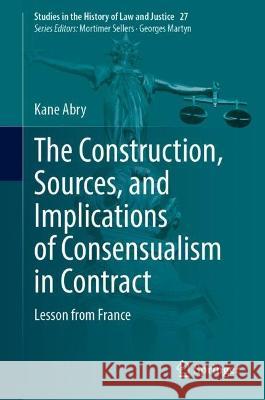The Construction, Sources, and Implications of Consensualism in Contract » książka
topmenu
The Construction, Sources, and Implications of Consensualism in Contract
ISBN-13: 9783031376405 / Angielski / Twarda / 2023
The Construction, Sources, and Implications of Consensualism in Contract
ISBN-13: 9783031376405 / Angielski / Twarda / 2023
cena 644,07
(netto: 613,40 VAT: 5%)
Najniższa cena z 30 dni: 616,85
(netto: 613,40 VAT: 5%)
Najniższa cena z 30 dni: 616,85
Termin realizacji zamówienia:
ok. 22 dni roboczych.
ok. 22 dni roboczych.
Darmowa dostawa!
This book offers a comprehensive introduction to French contract law with a focus on the role of consent and the evolution of consensualism, considering its immediate historical sources. The book provides a clear, in-depth, and analytical discussion of the contingency of consensualism and how the development of consensual ideas across time and transnational geographical settings has specifically underpinned modern French contract law, which has inspired other legal systems and continues to do so. It also challenges the macro-narratives of European legal history and redefines consensualism so that it may be properly understood, addressing its manifest contemporary misinterpretations. Thorough, engaging, well-structured and inventive, there is no other English-language scholarly work that offers a similar analysis.
“This monograph makes an evident contribution to the field by offering an original interpretation of several provisions in the Code Civil which relate to the law of contract. The author demonstrates an impressive grasp of Latin, French and English sources as well as knowledge of Roman law, legal history, and contemporary French law. It is well-referenced and offers an extensive bibliography”. – Dr Stephen Bogle, Senior Lecturer in Private Law, University of Glasgow, UK
“The author brings a critical perspective to bear throughout the monograph and develops a clear and quite sophisticated position on the interaction between consensualism and formalism in Roman and French law and the intervening European ius commune”. – Prof Hector MacQueen, Emeritus Professor of Private Law, University of Edinburgh, UK











